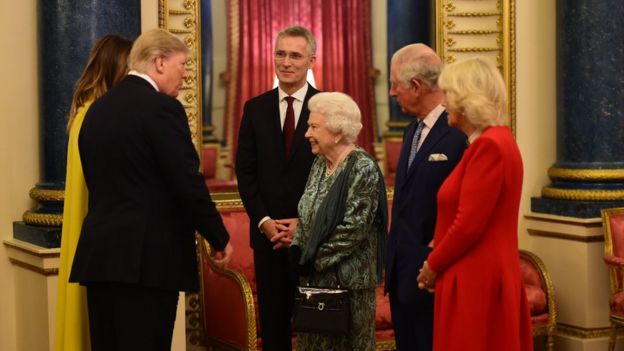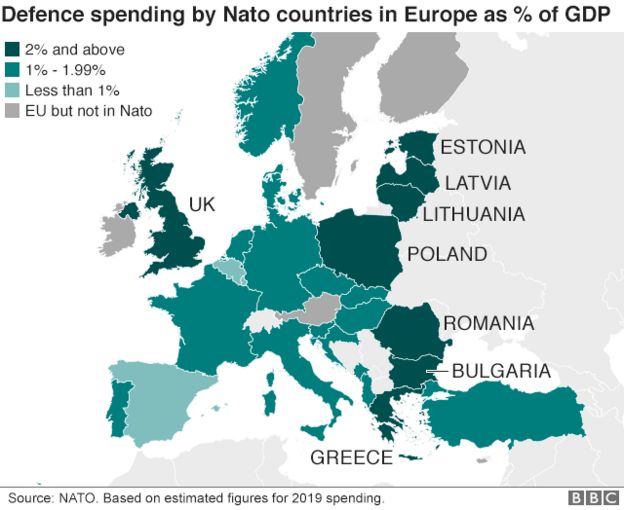
Nato leaders are meeting near London, as tensions between members threaten to overshadow a summit marking the military alliance's 70th birthday.
The three-hour talks are expected to cover issues such as cyber-attacks and the strategic challenge posed by China.
In opening remarks, UK Prime Minister Boris Johnson reminded members of the alliance's principle of "one for all, and all for one".
Tuesday saw sharp exchanges between the US and French leaders over many topics.
The highly choreographed anniversary gathering, intended to show unity, has been unable to hide deep differences between member states, BBC Defence Correspondent Jonathan Beale reports.
Although the 29-member bloc's future is not in doubt, there are disagreements over Turkey's recent military action in northern Syria, the levels of military spending by members and recent comments by French President Emmanuel Macron that the alliance is "brain dead".
Despite the divisions, Mr Johnson described Nato as a "giant shield of solidarity" that "protects nearly a billion people", saying at the start of the meeting at a luxury resort near Watford: "As long as we stand together no-one can hope to defeat us."
Nato Secretary General Jens Stoltenberg cited increased spending commitments on defence by European allies and Canada, saying: "Nato is the most successful alliance in history because we've changed as the world has changed".
Since becoming US president, Donald Trump has frequently and forcefully criticised how much other Nato allies spend on defence.
The first day of the special anniversary summit saw tensions bubble to the surface. Mr Trump and Mr Macron met for talks and in a news conference sparred over Nato's role, Turkey, and Islamic State group (IS) fighters.
Ties between Mr Trump and Mr Macron were already strained amid a dispute over taxes and trade, and comments from the French president last month that the US commitment to the alliance was fading.
Mr Trump had earlier hit back by saying the French leader had been "very disrespectful" by describing Nato as "brain dead" in what he said were "nasty" comments. Mr Macron then said he stood by his words.
President Trump and Mr Johnson held unscheduled bilateral talks and, ahead of Wednesday's talks, Mr Trump tweeted they both had "talked about numerous subjects including Nato and trade."
Meanwhile, a brief video posted on Twitter by Canada's public broadcaster, CBC, appeared to show Canadian Prime Minister Justin Trudeau commenting on Mr Trump's impromptu news conference that lasted almost an hour on Tuesday.
"You just watched his team's jaws drop to the floor," Mr Trudeau said to a group that included Mr Johnson and Mr Macron during the reception at Buckingham Palace, without mentioning the US president's name. None of them appeared to realise that they were being recorded.
Nato started out in 1949 with just 12 countries as members but having now expanded to a bloc of 29 it is increasingly difficult for the alliance to project a united front.
Two key issues have loomed over this summit: defence spending - a longstanding issue of concern for the US, which militarily dominates the group - and relations between Turkey and other member states.

The Queen talks to President Trump and his wife Melania during the reception at Buckingham Palace
Before departing for London, Turkish President Recep Tayyip Erdogan said he would oppose a Nato defence plan for the Baltic region if the bloc did not support Turkey over its fight against Kurdish groups in Syria it considers terrorists.
But other leaders, including Mr Macron, have made clear they oppose such a move, not least because Kurdish-led forces drove IS militants out of a quarter of Syria with the help of a US-led multinational coalition.
Turkey's relations with other Nato members have been strained since it started a military offensive in Kurdish-controlled areas of northern Syria in October. That followed the decision by President Trump to withdraw US troops from the region, reportedly without consulting allies.
"When I look at Turkey, they now are fighting against those who fought with us shoulder to shoulder against [IS]," the French president said alongside Mr Trump.
Mr Erdogan's decision to buy the S-400 Russian missile defence system further exacerbated tensions. Mr Trump said he was "looking at" imposing sanctions over the deal while Mr Macron asked: "How is it possible to be a member of the alliance... and buy things from Russia?"
On Tuesday, Mr Macron also attended a meeting in Downing Street with President Erdogan, German Chancellor Angela Merkel and Mr Johnson.
Meanwhile, Mr Stoltenberg said Canada and European allies had added $130bn (£100bn) to defence budgets since 2016 and that this number would increase to $400bn by 2024.

Nato estimates for 2019 show there are now eight countries - in addition to the US - meeting the target agreed by all Nato members to spend 2% or more of their gross domestic product (GDP, a measure of economic output) on defence.
The North Atlantic Treaty Organisation is the world's most powerful defence alliance